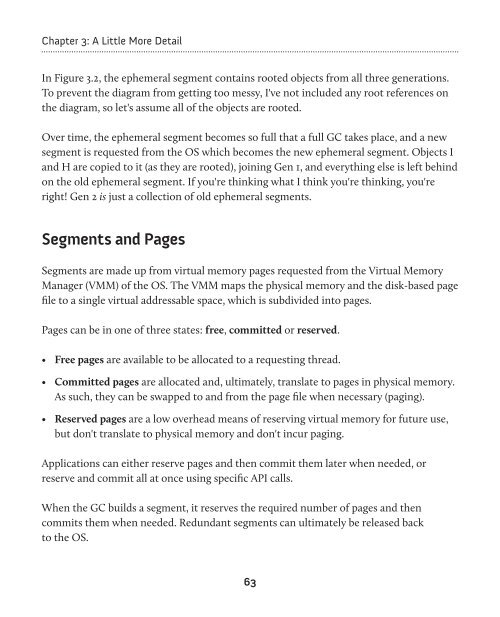Under the Hood of .NET Memory Management - Simple Talk
Under the Hood of .NET Memory Management - Simple Talk
Under the Hood of .NET Memory Management - Simple Talk
Create successful ePaper yourself
Turn your PDF publications into a flip-book with our unique Google optimized e-Paper software.
Chapter 3: A Little More Detail<br />
In Figure 3.2, <strong>the</strong> ephemeral segment contains rooted objects from all three generations.<br />
To prevent <strong>the</strong> diagram from getting too messy, I've not included any root references on<br />
<strong>the</strong> diagram, so let's assume all <strong>of</strong> <strong>the</strong> objects are rooted.<br />
Over time, <strong>the</strong> ephemeral segment becomes so full that a full GC takes place, and a new<br />
segment is requested from <strong>the</strong> OS which becomes <strong>the</strong> new ephemeral segment. Objects I<br />
and H are copied to it (as <strong>the</strong>y are rooted), joining Gen 1, and everything else is left behind<br />
on <strong>the</strong> old ephemeral segment. If you're thinking what I think you're thinking, you're<br />
right! Gen 2 is just a collection <strong>of</strong> old ephemeral segments.<br />
Segments and Pages<br />
Segments are made up from virtual memory pages requested from <strong>the</strong> Virtual <strong>Memory</strong><br />
Manager (VMM) <strong>of</strong> <strong>the</strong> OS. The VMM maps <strong>the</strong> physical memory and <strong>the</strong> disk-based page<br />
file to a single virtual addressable space, which is subdivided into pages.<br />
Pages can be in one <strong>of</strong> three states: free, committed or reserved.<br />
• Free pages are available to be allocated to a requesting thread.<br />
• Committed pages are allocated and, ultimately, translate to pages in physical memory.<br />
As such, <strong>the</strong>y can be swapped to and from <strong>the</strong> page file when necessary (paging).<br />
• Reserved pages are a low overhead means <strong>of</strong> reserving virtual memory for future use,<br />
but don't translate to physical memory and don't incur paging.<br />
Applications can ei<strong>the</strong>r reserve pages and <strong>the</strong>n commit <strong>the</strong>m later when needed, or<br />
reserve and commit all at once using specific API calls.<br />
When <strong>the</strong> GC builds a segment, it reserves <strong>the</strong> required number <strong>of</strong> pages and <strong>the</strong>n<br />
commits <strong>the</strong>m when needed. Redundant segments can ultimately be released back<br />
to <strong>the</strong> OS.<br />
63











